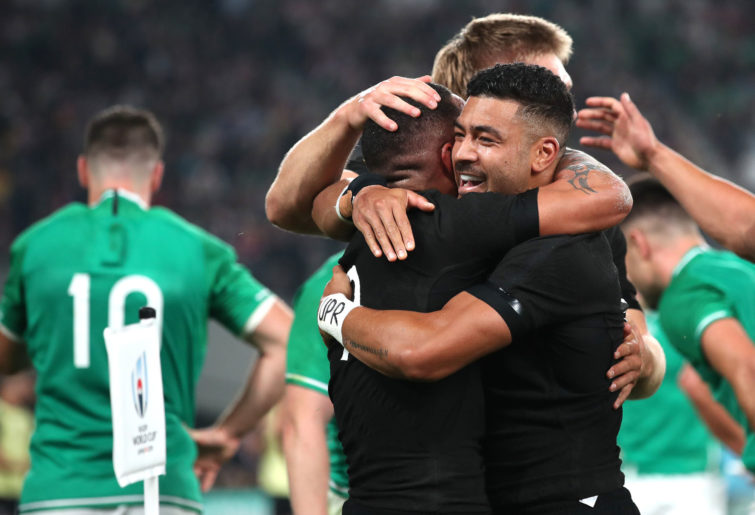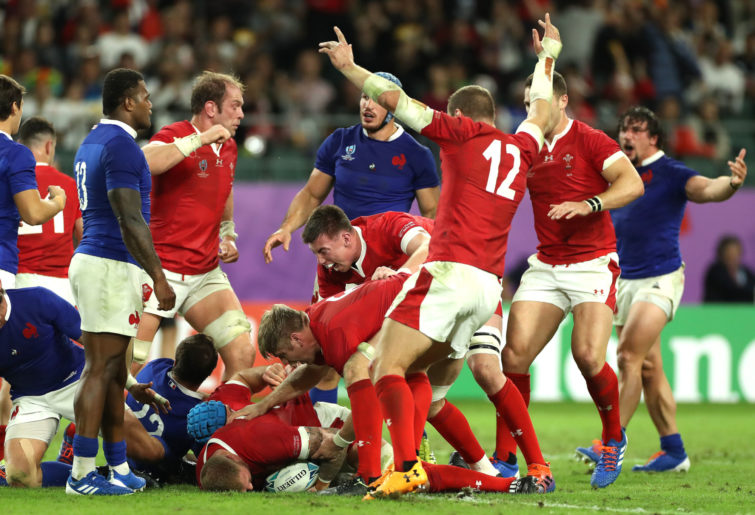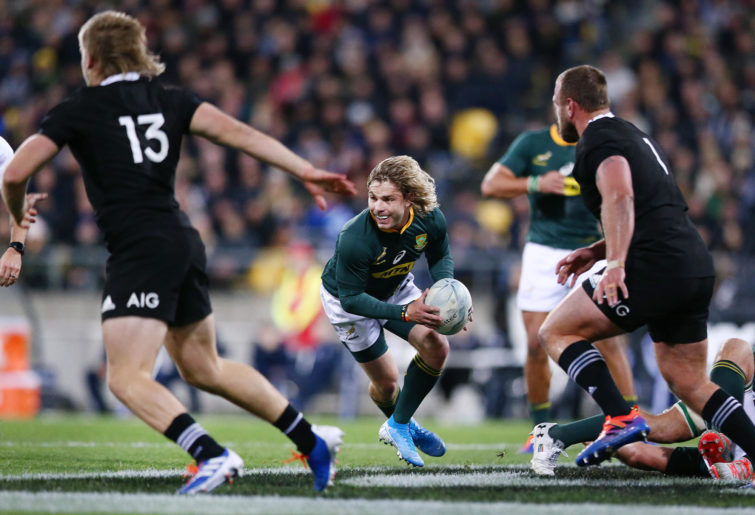What a difference four years makes. The northern hemisphere powers are back in World Cup final contention after a dismal performance from them in the 2015 tournament.
The semi-finals of that World Cup featured four teams from the southern hemisphere: New Zealand, Australia, South Africa and Argentina.
With two teams from each hemisphere, the semi-finals in this World Cup tournament reflect a better balance between north and south.
This balance opens up the possibility of two northern hemisphere powers playing off in the final: England and Wales. Unlikely.
There are two different possibilities of a northern vs southern hemisphere final: New Zealand and Wales or England and South Africa. Unlikely.
The last option is an all-southern hemisphere final: New Zealand vs South Africa. The most likely outcome.
If this is the grand final line-up, it will go against history. Most World Cup finals have featured one team from each hemisphere – six in total (1987, 1991, 1999, 2003, 2007 and 2011).
Two finals, in 1995 and 2015, have featured two teams from the southern hemisphere.
Two theories have been put forward about what style of play is likely to be the most effective in this tournament.
Robbie Deans argues that attack gives the All Blacks a winning edge. I discussed this theory after the All Blacks narrowly defeated the Springboks in their opening match of the tournament.
Deans published a list of the best attacking team, the best defensive team and the winning team in all the tournaments. The best defensive teams won five tournaments: Australia in 1991, South Africa in 1995, Australia in 1999, England in 2003, and South Africa in 2007. The best attacking side has won three tournaments: New Zealand in 1987, as well as the two most recent editions.
Deans argued that the last two tournaments have set a pattern that could be followed once more in 2019.
“On three occasions the best attacking team prevailed over the best defensive team at the Rugby World Cup,” he wrote. “Those occasions have coincided with the All Blacks Rugby World Cup titles.”
Deans further noted that the All Blacks selectors concentrated their selections on “a point of difference as a team that would ultimately separate them from the rest”.
That point of difference was “the relentless attacking mindset from the back three”, which was difference between the Springboks and the All Blacks in their pool clash.
In a follow-up article foreshadowing the semi-final between the All Blacks and England, Deans noted that “the All Blacks created and maintained a momentum by varying the point and mode of their attack, recyclng ball at such speed that Ireland were never able to set their defensive line”.
The All Blacks’ seven tries against Ireland – a totally unexpected outcome against a team favoured before the tournament to be a real contender – suggests that there may be a lot to the Deans theory.

(Photo by Cameron Spencer/Getty Images)
Now for the second theory from former Springbok Brendan Venter, who argues “defence, not attack, wins Rugby World Cup tournaments”.
Writing about the coming quarter-final clash between Japan and the Springboks, Venter said: “Everybody is talking about Japan’s attacking shape, the quality of their skill set as well as their offloading and finishing ability. Japan has the best attack but unfortunately, good attacks don’t win World Cups – effective defences and set-pieces do.”
Venter, shrewd analyst that he is, has not looked carefully enough at how the tournament has evolved on the field.
The opening pool rounds were dominated by refereeing decisions relating to head-high tackles and, on one occasion, to a head-high collision created by a runner.
The effect of the outlawing of contact to the head, even when it is accidental, has had the effect of restoring some sort of balance between small and big players.
The adage that a big, strong man will always beat a small, strong player is under pressure now from the new head-high collision laws.
And this is having the effect of bringing back into prominence fast, exciting, smaller backs and penalising, to a certain extent, the brutal dominance that big players used to exert.
The quarter-finals, too, produced two big and unexpected blow-out results, with England monstering the Wallabies and the All Blacks overwhelming Ireland.
The team that could be most affected by this change of approach with the referees favouring open, skilful rugby is Wales. Throughout the tournament, Wales have scrapped to wins by grinding down their opponents, with a restrictive attack and a dogged defence.
It was clear while watching Wales grinding their way to a win against an exuberant French side that the red card intervention in the 47th minute against lock Sébastien Vahaamahina virtually handed Wales a victory they didn’t deserve.
Even then, it took Wales to the end of the match to score a rightly contested try to give them the narrowest of victories, 20-19.
I say rightly contested try because it was obvious, or should have been obvious, to the referee Jaco Peyper that the ball went forward from a strip by the Welsh halfback Tomos Williams.

(Photo by David Rogers/Getty Images)
George Gregan made the call before the tournament began that the (deliberate?) lack of attack by Wales will cost them the trophy. “I just have my doubts whether the way they play is going to be conducive to scoring a lot of points in a World Cup, and the conditions on Japan will be very conducive to keeping the ball in hand and playing.”
I agreed with this assessment before the tournament, and even more so now that the stormy season has ended and conditions should be quicker going into the semi-finals and the final.
To a lesser extent, the criticism of putting defence ahead of attack can be extended to the Springboks.
In the pre-World Cup warm-up matches, the Springboks monstered Japan 41-7, smashing them in the mauls, set-pieces and in the air. But when it came to the quarter-final, it was a different story.
For the first half especially, Japan stayed in touch with the Springboks before leaking a couple of tries and penalties in the second half.
Early on in the first half, the Springboks were extremely lucky that Tendai Mtawarira was given a yellow card, rather than a red, for a tip-tackle on Keita Inagaki.
Referee Wayne Barnes immediately gave a yellow card rather than doing what has usually happened in the tournament and started a discussion with the TMO and his two assistant referees.
The Springbok forwards, especially in the second half, over-powered their smaller Japanese opponents. One rolling maul, taken at a canter for what seemed about 40 metres or so, led to a try by the live-wire halfback Faf de Klerk.
The Springboks will not be able to do this against Wales, or if they make the final against England or the All Blacks.
The Springboks also maintained their incredible record of not losing a lineout in the tournament.
Currently, the record stands at 57 Springbok lineouts and 57 wins. And this lineout dominance could be significant for them, as it was in the 2007 World Cup tournament.
De Klerk and an even smaller Cheslin Kolbe give the Springboks some energy and flair to go with the heavy-metal forward play that dominates the side’s game plan. That’s why they will defeat Wales in their semi-final.

(Photo by Anthony Au-Yeung/Getty Images)
Although, I should note that Robbie Deans is not so sure. “Based on the efforts of last weekend South Africa should secure a place in the final but they do have a checkered history against Wales,” he wrote.
I would place England closer to playing the all-court game of the All Blacks than either South Africa or Wales.
England were not quite as impressive in smashing the Wallabies as the All Blacks in their quarter-final demolition of Ireland. But it was a terrific performance in its own right.
England made 181 tackles and showed a defensive system that is going to be harder for the All Blacks to break than Ireland’s.
The England attack, too, was very composed and alert for interceptions and turnover.
Last November the All Blacks beat England at Twickenham 16-15. This is the only time an Eddie Jones-coached England side has played the All Blacks.
It will be fascinating to see what tactics the two master coaches, Steve Hansen and Eddie Jones, put out in this semi-final.
The England-New Zealand match will be refereed by Nigel Owens (Wales), with Romain Poite and Pascale Gauzere (both France) as assistant referee and Marius Jonker (South Africa) as TMO. This combination does not favour either side, although Jonker likes to intervene a lot and this could have an impact against the All Blacks – a side he seems to focus on a lot.
Jerome Garces (France) will referee Wales-South Africa match, with Wayne Barnes (England) and Ben O’Keeffe (New Zealand) and Ben Skeen (New Zealand) as TMO.
This is a wildcard group of officials. Garces tends to referee with an inclination towards the side with the best set piece. This is likely to be the Springboks. Ben Skeen is something of a loose cannon. He makes interventions that are sometimes wrong. Who this will help is anyone’s guess.
Just one final point. The excellent World Cup Power Ranking forecast by Stuff.co.nz has made the following projections: New Zealand has a 62 per cent chance of defeating England, while Wales has a 57 per cent chance of defeating South Africa.
As many readers of the Roar will know, I am the only non-gambling Greek living at Bondi Junction.
But without putting any money on the matter, my fearless prediction is that the All Blacks and the Springboks will win their respective semi-finals, and go forward to a fearsome contest in the final.































































































